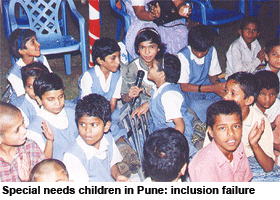Inclusive education for children with disabilities in Pune (pop. 9 million), the second industrial hub of Maharashtra (after Mumbai), is a distant dream. Under the Right to Free and Compulsory Education Act, 2009, it is incumbent upon the state to provide free and compulsory education to all children between 6-14 years, including children with disabilities. Moreover special needs children are included in the category of poor neighbourhood children entitled to a 25 percent quota in private unaided schools.
However this inclusion provision is not backed by political and social action. The number of specialised schools for differently abled children in Pune has been steadily increasing — from 13 in 1983 to 80 today catering to 2,400 children — a clear indication that the 700 mainstream schools in the city (private and public) have not been able to integrate differently abled children within their classrooms.
 While the RTE Act is recent legis-lation, the Persons with Disabilities (Equal Opportunities, Protection of Rights and Full Participation) Act, 1995, unanimously passed by Parliament 18 years ago, which makes it mandatory for the State (Central, state and local governments) to provide free and compulsory education to children with disabilities (s.26 (a)), and/or include them in mainstream schools (s.26 (b)), has also been respected more in the breach than observance.
While the RTE Act is recent legis-lation, the Persons with Disabilities (Equal Opportunities, Protection of Rights and Full Participation) Act, 1995, unanimously passed by Parliament 18 years ago, which makes it mandatory for the State (Central, state and local governments) to provide free and compulsory education to children with disabilities (s.26 (a)), and/or include them in mainstream schools (s.26 (b)), has also been respected more in the breach than observance.
During the past 65 years since independence, the Pune Municipal Corporation (PMC) has managed to construct only one dedicated school for special needs children — the Lal Bahadur Shastri Primary School, Shivajinagar — with an enrolment of 18 students (half of whom cannot attend the school regularly as commuting is a serious concern with no hydraulic-lifts fitted buses to transport them). While Rs.20 lakh was promised to this school last year, not only does it remain unutilised (it has no physiotherapists, counselor, or enabling infrastructure), there has been no mention of inclusive education at all in PMC’s annual budgets for education (Rs.297.78 crore in 2012-13) since the Sharad Pawar-led Nationalist Congress Party was elected to the corporation in 2007. Allocations have instead been made for distribution of cycles, introduction of yoga and recruitment of yoga teachers, frivolous celebrations etc, which could have waited until basic facilities such as ramps, tactile paths, qualified special educators and other favourable infra-structure was provided to encourage admission of differently abled children in PMC schools.
“The situation isn’t much better in private schools. We receive many complaints from parents of differently abled children saying their wards are denied admission on grounds of schools lacking special educators — the most basic requirement for creating a friendly atmosphere for the differently abled,” says Minita Patil, manager of the Pune-based NGO Bal Kalyan Sanstha (estb. 1979), a recreational and cultural centre which offers education and therapy to 500 differently abled children.
The acute shortage of trained educa-tors for special needs children being experienced in Pune is a direct outcome of the small number of teacher training institutions offering special education study programmes in the city, and across the state. Maharashtra (pop. 112 million) has only 24 Rehabilitation Council of India-certified teacher training centres offering special educa-tion diploma programmes — with only four in Pune, which certify 20-30 special educators each annually — clearly not enough for the 700 private, aided and government schools of the city. Additionally, non-inclusion of special education in the regular B.Ed (bachelor of education) programme has aggravated the problem with teachers employed in government as well as private schools ill-qualified to implement inclusive education pedagogies in their classrooms.
Quite clearly, legislation and policies can be meaningful only if implemented effectively and backed by political and social will. The pathetic condition of Maharashtra’s estimated 4 million differently abled children is testimony to this truism.
Swati Roy (Pune)